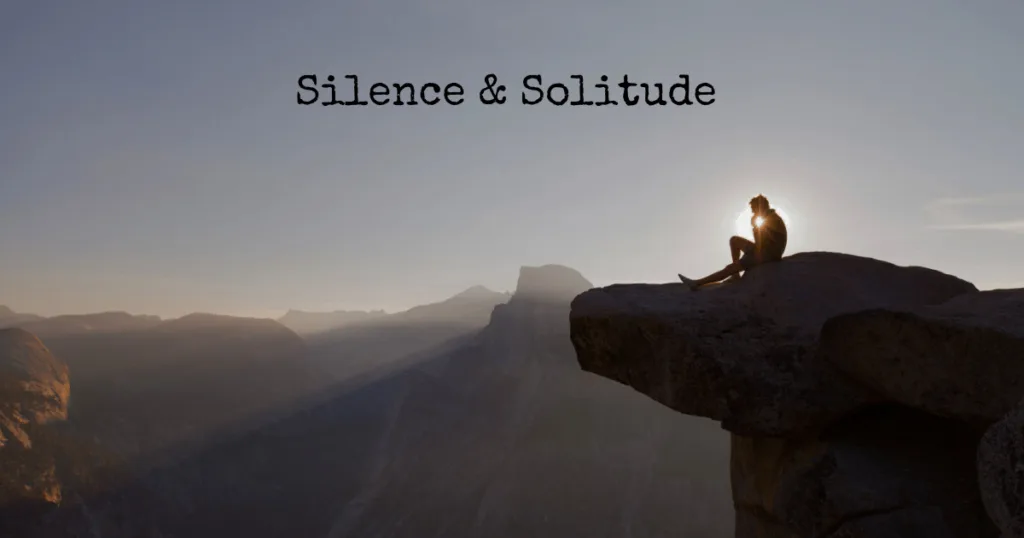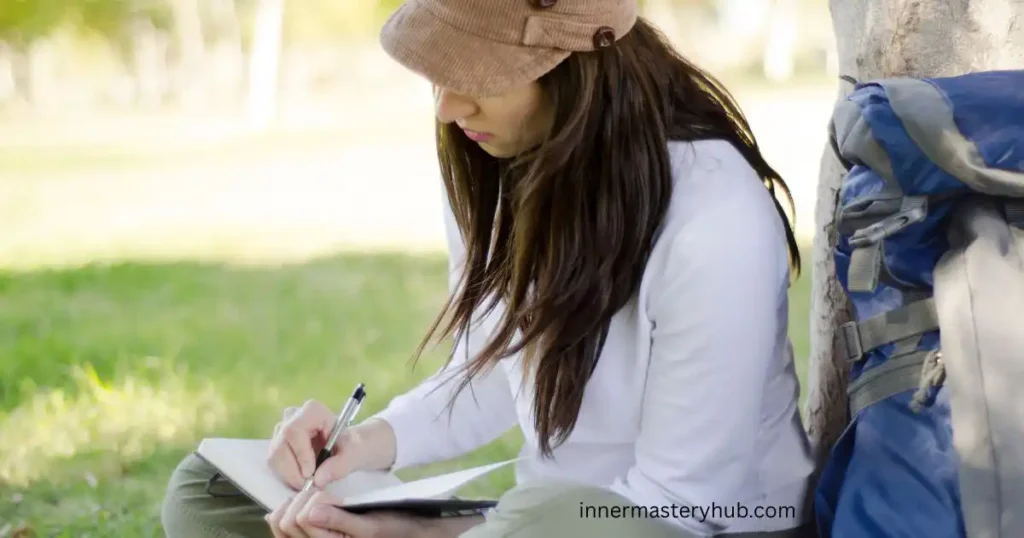7 Easy Ways To Practice Spiritual Solitude
Practice Spiritual Solitude
Spiritual solitude is quiet time alone to reconnect with your inner self and something greater. Step away from noise, screens, and expectations. Breathe slowly, notice your thoughts without judging them, and let stillness guide you. Even a few minutes can bring clarity, peace, and renewed purpose.

What is solitude?
We often preoccupy our minds with too much toxicity in the rush of our everyday lives, which drains us when we don’t make time for solitude. We all need some alone time to recharge, but that doesn’t mean we should spend it binge-watching TV shows or listening to loud, trashy music.
Going outside would be the most excellent option to observe in peace and listen in silence to what nature has to say to you. Instead, it must be a process of spending time alone, monitoring your thoughts, and understanding the patterns they make in your mind.
Yes, quietness speaks; in fact, it says a lot. To listen to the truth of its words and seek silence, you must empty your mind, practice silence alone, and ponder. That’s what is referred to as practicing spiritual solitude. In this article, I will share seven easy ways to practice solitude.
Difference Between Loneliness And Spiritual Solitude
You feel lonely when there is a void in your life. Try a few trials to bridge the gap, but it will only last so long. On the other hand, inward silence and solitude are a desire to spend time alone, delving deeper within yourself in blissful solitude. Your innermost self is restored and unveiled in a solitary place, allowing you to hear God’s voice more clearly.
You need to make time for a few hours away from background noise in a quiet place, a part of your daily routine, to avoid becoming cluttered with unimportant ideas and information, which can make it impossible to find what you’re looking for.
Positive Inward Silence And Spiritual Solitude
Instead of just watching a trashy show or beating yourself up, positive spiritual isolation can be practiced to spend time contemplating and focusing. Finding the meaning and purpose of your life leads to pleasant feelings, compassion, and fulfillment, as well as the exploration of your creative side.
Regular isolation helps you develop a focused attitude that enables you to utilize all your abilities to achieve your objectives. When you go into reflective mode, creative thoughts flow to you. Maintaining regular isolation is a balanced strategy for using them. By completing more tasks in less time, you may maximize your potential.
How to practice spiritual solitude
Sometimes, God forces us to withdraw so that we might be conscious of ourselves, work to understand our reality, and experience a connection with God alone. You encounter God in your loneliness!
While alone in the wilderness, we discover our deepest desires, secrets, recurring patterns of behavior, and actions. We become aware of our societal and personal needs and can develop effective solutions.
This process of self-discovery and growth is often guided by spiritual coaching, helping us navigate these revelations. Nature is not a quiet, healing location. Instead, it serves as a site of conversion and spiritual formation, where the old self passes away, and the new self is born.
Reflective Mode
Your well-being depends greatly on your ability to think deeply. You can develop and flourish in it by raising your consciousness. To fully experience this mode, you must avoid distractions, turn off your phone, and find a calm area. You can go for a long stroll or meditate, ponder, write, pray, or listen to educational lectures that allow you to think or say your prayers.
To thrive and meet your emotional needs, it would be beneficial to have partnerships. However, you occasionally become worn out by the stress of your life and require some silence and spiritual isolation for a few hours to recharge before starting over.
How To Use Solitude For Setting Boundaries
Another definition of practicing spiritual solitude and discipline is establishing clear limits for yourself. The process of self-purification and discipline is underway, and with time, you can become accustomed to it, which will help you become a better version of yourself.
Practice “Me” timefor yourself to increase your potential and keep your mind sharp. This exercise will also increase your stamina.
Spiritual seclusion helps you gain a deeper understanding of who you are and teaches you the importance of establishing boundaries with yourself. Daily tasks become easier for you to complete, providing you with more energy. You may give your best to people in need when you’re content.
Islamic Perspective on Spiritual Solitude
In Islam, “khalwa,” or spiritual seclusion, is highly valued as a means to deepen one’s spiritual formation and strengthen one’s ties to Allah (SWT). Khalwa involves removing oneself from worldly distractions and the bustle of daily life, and concentrating solely on one’s relationship with Allah (SWT) in quiet, solitary places.
To practice silence, the act of khalwa, one frequently goes to a mosque, a quiet place, or an area of nature, or their own home, where they can meditate on the qualities of Allah SWT, the purpose of life, seek direction, and deepen their relationship with Allah (SWT).
Spiritual Solitude: The practice of God’s Messengers
During Ramadan, when the Prophet Muhammad (PBUH) would withdraw to a solitary place in the cave of Hira to think and contemplate, the Prophet Muhammad (PBUH) himself engaged in khalwa on multiple occasions away from the bustle of the city. The Quran also encourages believers to spend time alone contemplating Allah’s messages and signs, as this can help them better understand their motivations and deepen their faith.
Moses frequently set aside time to spend alone with God. Moses spent forty days alone with God, and Jesus practiced spiritual solitude in God’s presence. But if we work at it, we may also develop the discipline of isolation.
Balance Spirituality And Material Life
While khalwa can be a profoundly fulfilling spiritual practice, it should not be seen as a means to escape the obligations of daily life or society completely. Islam strongly emphasizes striking a balance between one’s responsibilities to Allah and those to the outside world. Islam strictly prohibits monasticism. Instead of rejecting what Allah has permitted to be created, Islam promotes taqwa (fear) of death and taqwa (faith) in God.
Spiritual Solitude And Emotional Intelligence
Solitude can help people better understandtheir emotions and thought processes and discover more efficient coping mechanisms. Reflecting on Allah’s qualities can deepen one’s understanding of the interconnectedness of all living things, leading to greater sensitivity and more profound empathy for others.
Additionally, spiritual seclusion can provide people with the space and time to reflect on their actions and emotional triggers, identify areas for personal growth, and seek Allah’s (SWT) assistance in overcoming personal challenges, ultimately helping them become emotionally resilient. By doing this, people can enhance their self-awareness, a crucial factor for effective self-regulation.
Reflection On Allah’s Names And Attributes
By reflecting on Allah’s names and attributes, individuals can gain a deeper understanding of the world and its place. They may also experience a sense of wisdom, spiritual renewal, and a strengthened connection to Allah (SWT).
It is crucial to remember that the knowledge gained through spiritual isolation should align with the direction of Islamic teachings and practices. Instead, they should deepen their understanding of Islam and bolster their faith. You learn empathy in secret by observing and reflecting when you become addicted to spending time alone with Allah SWT; HE improves the quality of your life and makes you realize the deep need to do something worthwhile for them in suffering.
Additionally, balancing solitude and social interaction is crucial, as Islam strongly emphasizes upholding one’s moral commitments in the material world while pursuing spiritual development.
What Are the Purposes of the Spiritual Solitude and Silence?
It would be beneficial to acknowledge that people are social animals. It’s clear. However, he can never be considered the only part of a totalitarian or religious apparatus. Societies rely on their seclusion and invulnerability to survive. People make up society; it is not merely composed of machines or data. Being a human entails having freedom and responsibility. Both involve a sense of realism, individualized awareness, and inward seclusion.
Ways to Begin in Quiet, Solitary Prayer
In the desert, it doesn’t seem conceivable to attain monastic status; all we have to do is sit still and be silent. The Desert Father’s approach can be applied to the lives we lead. Doing so involves reading your Holy Book every day.
Throughout the day, we can spend significant time alone with God in peaceful moments. Spending five minutes in prayer each day is an excellent approach to achieving that. People frequently drive to work or run errands independently, which can be a perfect opportunity to be quiet and alone.
Spiritual Solitude amplifies other disciplines.
Practically every subject requires collaboration with another person. We can pray, meditate, or worship almost anywhere. However, putting these disciplines into practice can improve focus and effort.
Ability to Listen to God’s and Your Voice
Theworld today is chaotic and verbless. You’ve received phone calls from certain persons who have spoken to you in a way that sounds like it came from your car radio or a TV newsreader. Your life is filled with information on things you should believe, do, or not. Hearing God’s voice or recognizing one’s own amid this constant noise can be challenging. Currently, it’s difficult to detect the faintest static frequencies.
Spiritual Solitude And Ego Depletion
Oh, how ego exhaustion and loneliness weigh on me! Isolation and loneliness may feel debilitating, sucking all of my energy and leaving me feeling dejected. When compelled to spend extended periods alone, I become increasingly depressed and cut off from the world, losing touch with my feelings and a sense of purpose.
When I try to please people without taking care of myself, I feel exhausted and self-conscious. When I ignore my wants to please others, I feel like I’m operating on empty.
Together, these two forces can crush. You feel trapped and unable to escape. I sometimes feel like I’m drowning in my thoughts and feelings, and I can’t get out.
Despite everything, I know there is hope. I may reconnect with myself and others, rejuvenate, and find meaning. Knowing it is possible inspires me to keep going, even if it is difficult.
Spiritual Awakening and Growth
Starting a journey of spiritual development in isolation can be very stimulating and soul-raising. It can be intimidating and thrilling to consider deliberately withdrawing from the world’s distractions and commotion to spend time alone with one’s thoughts and the divine.
As we strive to connect with our inner selves and the greater power, we may experience a range of emotions, from fear and doubt to joy and serenity, and everything in between. It is beautiful and challenging to let go of our old thinking and acting patterns and embrace a new, more enlightened path.
We face our inner demons, face our fears, and allow ourselves to be present when we are alone. In this serene setting, we can begin to hear the divine and our soul’s whispers, receiving direction and clarity for our journey.
What changes during this period of seclusion are nothing short of miraculous. With a stronger sense of purpose and a deeper connection to the world and the souls around us, we become more genuine, compassionate, and loving individuals.
Even if the road can feel lonely at times, the benefits are enormous. Because it is in spiritual isolation and silence that we learn the genuine core of who we are, and as a result, we are eternally altered.

Learn to See and Hear
According to Richard Foster, stillness and spiritual solitude have a function. The holy spirit within can communicate with us as long as our hearts are still before the Lord. Purification is a gift from God, as Jesus states. Furthermore, we must heed God’s words if we hear them. If you take a break during a period of sacred stillness and inward spiritual isolation, you should write about what you observe and hear in your notebook.
Discernment and Clarity in Decision-Making
Much is lost because of the spiritual solitude of a cell, which is only broken up for long periods of a few minutes by silent meals, the zeal of ritual, and extended walks alone in the woods. The tumultuous rivers of the psyche remain calm and clear. Your perception could appear off-balance.
Solitude makes you listen to others with attention.
When you practice spiritual solitude, you learn to reflect on yourself and become more aware of yourself. You pay attention to conversations with your loved ones, rather than just listening to their replies. This is a crucial step in developing emotional intelligence and empathy for others.
Learning to Practice Silence And In God’s Presence
More than just maintaining serenity and hearing God’s word, spiritual isolation with God can focus our attention on God continually and consciously, so that God is aware of us and interacts with us in our daily lives.
The Feeling That There’s Not Enough Time
It may be one of the most frequently cited reasons why many individuals fail to make time for relaxation. Sadly, the challenge is the simplest to overcome because it stems from an incorrect perception of what these fields demand. When we unpack them, we find silence, and we will probably be able to find them more quickly.
How Do You Get More Spiritual Solitude and Silence in the Busy Modern World?
“When we are entirely alone, we don’t worry about being alone because that doesn’t mean we are. While we won’t let them control us, we also don’t fear being near them. We find ourselves in a scenario where we feel overwhelmed when noise and confusion arrive. They may appreciate the beauty of this discipline.
Here are some exercises you can try to practice in Spiritual solitude
Meditate
Set aside some time each morning to sit in solitude and meditate. Concentrate on your breathing, and refrain from judging your ideas as they arise.
Take a stroll through nature.
Stroll gradually around a park or nature reserve, paying close attention to your surroundings. Note the sights, sounds, and feelings around you.
Disconnect from technology
Try going without any electronic gadgets or other distractions for a while. Turn off the TV, internet, and phone, and assess your mood.
Write
Keep a notebook and record your ideas, emotions, and experiences. This can be an excellent way to process feelings and develop a sense of self.
ART
Participate in artistic endeavors such as writing, drawing, or painting. This can help you discover your inner self and express your emotions.
Plan a solo Trip
Find a quiet place where you may spend time alone thinking. Take some time to reflect, relax, and rejuvenate.
Instead of avoiding the people or things you enjoy, remember that practicing spiritual solitude is about making time for purposeful introspection and contemplation.
How Extroverts Can Practise Spiritual Isolation
Practicing solitude can be difficult for extroverts who rely on social connections and external stimulation. However, seclusion and solitude can also benefit your mental and emotional health. For extroverts who prefer to practice isolation, here is some advice:
Begin modestly.
Allow yourself a few minutes of spiritual solitude throughout the day. Going for a 10-minute walk or spending time alone in a quiet place may help.
Make your surroundings peaceful and safe for isolation. Find a quiet place to contemplate and relax.
Don’t get bored while meditating alone; make it enjoyable. Have fun reading, writing, painting, or listening to music. These activities can help you unwind.
Limit your social media usage.
It might be challenging to practice isolation when social media is a constant source of stimulus and distraction. Consider reducing or quitting social media altogether.
Instead of attempting to avoid thinking about or feeling your ideas and feelings, embrace them. Use your alone time to reflect on your emotions, ambitions, and thoughts.
Practice mindfulness
Mindfulness meditation may help extroverts cultivate solitude. You can cultivate calmness and clarity by focusing on your breathing and staying present in the moment.
Remember that you don’t have to give up your extroverted traits to practice isolation thoroughly. Maintaining mental and emotional health requires striking a balance between social and solitary time.
Solitude as a tool to become a better version of yourself
Spiritual seclusion can be a potent tool for improving who you are. It can be helpful in the following ways:
Self Reflection
By taking the time for peaceful reflection, you can gain a deeper understanding of yourself and your inner world. You can use this time to identify areas for growth and implement healthy changes in your life.
Connection To The Divine
Being alone can help many people develop a sense of universal consciousness or a connection to a higher power. A feeling of calm, purpose, and direction may result from this.
The Development of Inner Peace
In today’s busy world, it’s easy to feel overworked and under pressure. To cultivate inner peace, spiritual seclusion can help you discover quiet, take your time, breathe, and focus on the present moment.
Growing a Sense of Appreciation
Spending time reflecting on your life’s events and blessings can help you develop a deeper sense of gratitude, leading to greater contentment and happiness.
Strengthening the Connections
Having a better sense of self and inner serenity makes your relationships with other people more meaningful. Your ability to connect with people spiritually may improve, and you may be more aware and present in your relationships.
Overall, by providing you with time for reflection, building a relationship with the divine, and cultivating inner peace and gratitude, spiritual seclusion and retreat can help you become a better version of yourself.
My Reflections
Your highest potential can be realized through the practice of spiritual seclusion. You would not understand without engaging in deepwork in solitude and devotion. When a choice needs to be made, enter a meditative state to gain new perspectives and innovative solutions.
In Islam, seclusion is called “khalwa.” It can offer people insightful opportunities for self-reflection. One may develop a deeper understanding of oneself and one’s purpose, and one’s spirituality may advance when one retreats from the diversions of daily life and concentrates only on one’s relationship with Allah (SWT).
People can use seclusion to reflect on their actions and behavior, find opportunities for personal growth and insight, and ask Allah for help in overcoming obstacles in their personal lives.
FAQs about Spiritual Solitude
What is the spiritual meaning of solitude?
Spiritual solitude means choosing quiet time alone to connect with your inner self and the Divine. It is not loneliness. It is a purposeful pause from noise, to listen, reflect, pray, and find direction.
What are the spiritual benefits of solitude?
Solitude calms the mind and reduces emotional clutter. It strengthens self-awareness, patience, and gratitude. It deepens prayer or meditation, helps you hear your conscience clearly, and restores spiritual energy, clarity, and inner peace.
How to practice spiritual solitude?
Pick a quiet place and set a short time daily. Silence your phone. Sit comfortably, breathe slowly, and observe thoughts without chasing them. Pray, read sacred words, or meditate. End with gratitude and one intention for the day.
What is spiritual isolation?
Spiritual isolation is being cut off from supportive people, faith community, or meaningful connections. It may happen by choice or circumstances, but it often feels heavy and lonely. Unlike solitude, it reduces encouragement, balance, and spiritual growth.
What is the spiritual power of silence?
In our contemporary, busy society, silence carries a divine force that is frequently disregarded. It is a portal to a world of greater comprehension and kinship with the sacred. Amid the chaos of daily life, silence helps us connect with our inner selves and discover quiet.
The Need for Spiritual Healing
Spiritual healing focuses on the relationship between the mind, body, and spirit to address the more profound aspects of well-being. It provides comfort, inner tranquillity, and a sense of direction.






